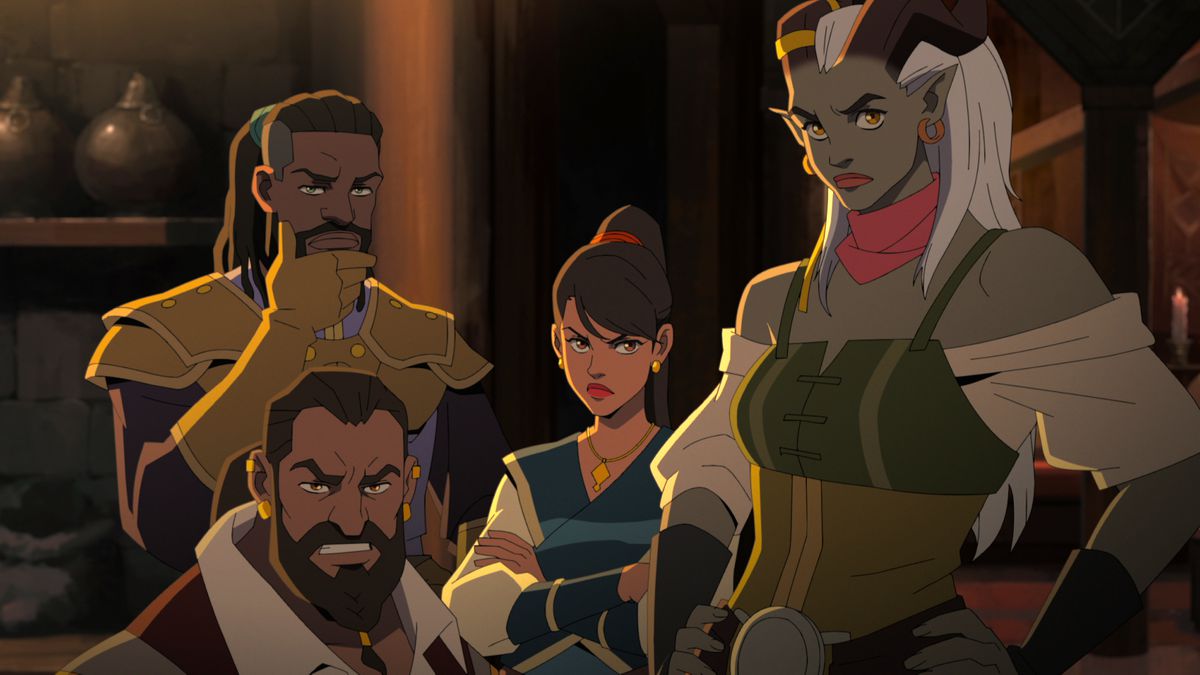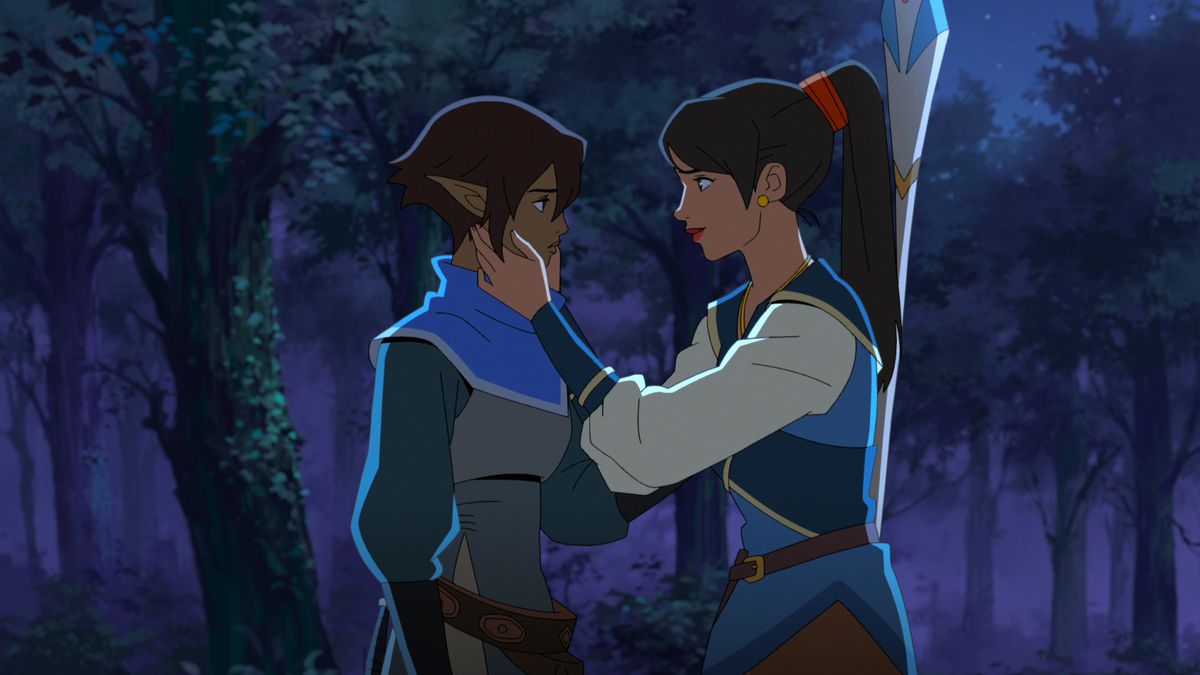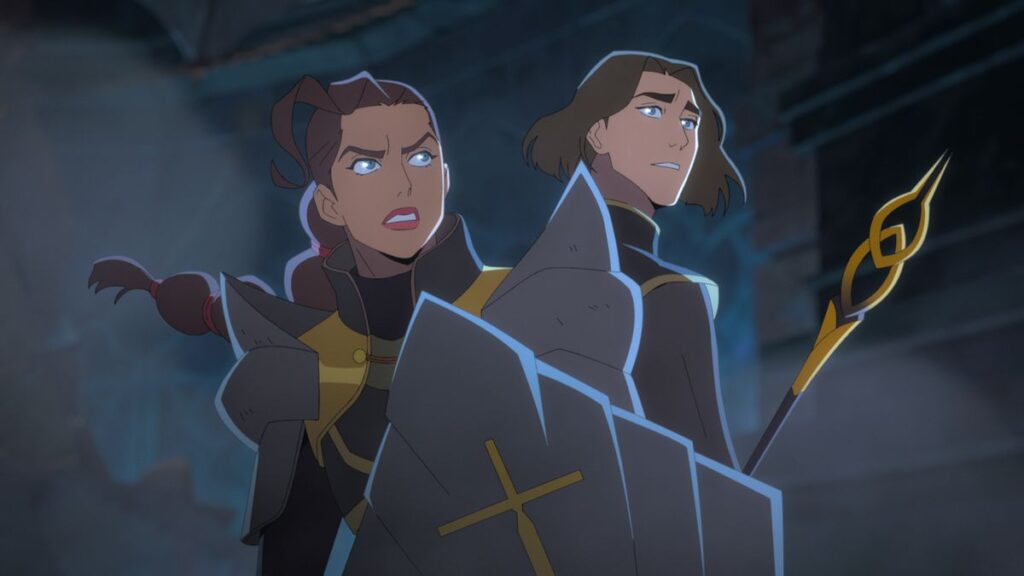I’ve only been into Dragon Age for four-ish years now, but even I know just how desperate the fandom is for any and all new drips of story. It’s been a long drought since 2014’s Dragon Age: Inquisition, so a six-episode animated Netflix series is an absolute feast.
But at the same time, Dragon Age: Absolution is barely anything. Yet, it’s something. Yet, yet, it’s also not a lot to go off of. Yet, yet, yet, it still manages to pack in a lot of what makes Dragon Age so compelling. Yetttttttt it’s only six half-hour episodes! Argh! Basically, the series is just as frustrating as every teeny tiny bit of new Dragon Age content, and still, I adore it. Will it affect the next game in any way? Part of me hopes not — though I do want to see these characters again. Here’s why.
[Ed. note: This post contains spoilers for the Dragon Age games and some light setup spoilers for Dragon Age: Absolution.]
Image: Netflix
Dragon Age: Absolution follows a group of thieves who journey to the magic-dominated country of Tevinter in order to steal a dangerous artifact known as the Circulum Infinitus. Elf assassin Miriam (Kimberly Brooks) is roped into this mission by her former lover Hira (Sumalee Montano), a passionate mage working for the Inquisition (the titular organization in the 2014 Dragon Age game — the franchise’s most recent entry — which, depending on the player’s decision, may or may not be disbanded; we’ll get to that in a sec). Miriam is a runaway slave from Tevinter, reluctant to return, but Hira tells her that after this mission, they’ll go on to live a peaceful life together. Joining the two of them are Fairbanks (Matthew Mercer), a minor character from the game and an Inquisition agent; human mercenary Roland (Phil LaMarr); plucky Qunari mage Qwydion (Ashly Burch); and grumpy dwarf Lacklon (Keston John).
While the crew plots their heist, Tevinter magister Rezaren (Josh Keaton) attempts to unlock the secrets of the Circulum, convinced that once he figures out how to bring back the dead with it, all his problems will be solved. His loyal Knight-Commander Tassia (Zehra Fazal), however, worries that he will go too far on his mission. This all comes to a head when the gang of thieves accidentally triggers an elaborate security system, trapping everyone inside the walls of a palace — and as it turns out, a few of the thieves have a more personal connection to the mission than initially revealed. Even with the heist and the Circulum driving most of the plot, the show focuses on these eight characters and their relationships, and by doing so, it makes the most out of what it is able to do given the games’ player-driven parameters.

Image: Netflix
From the get-go, Dragon Age: Absolution is working in a curiously limited framework. There is only so much it can do that won’t drastically change the world in the setup for the next game, or make assumptions about the choices the players made in the previous games. The show brings us to Tevinter — the highly anticipated setting of Dragon Age: Dreadwolf — but keeps the characters confined pretty much to a single palace, since the big reveal of the greater world is best left for the game itself. Favorite characters from the games only make cameos and other brief appearances, because their ultimate fates depend on player decisions.
Hell, even the very existence of the Inquisition depends on whether or not the player dismantled the organization at the end of the last game’s final expansion. Hira mentions that this mission came from right before the Inquisition disbanded, which seems to answer that somewhat, but the characters still reference bringing the artifact back to what is left of the organization — when the characters talk about the Inquisitor, they keep it very generic, so familiar viewers can picture their own player character. It’s just enough to string viewers along, but not enough to actually be satisfying. That’s probably for the better, though, considering that this animated show isn’t the franchise’s main medium. With one hand tied behind its back, the show does what it can.
The very heart of Dragon Age — the component that makes it so compelling to fans after all these years — isn’t necessarily the lore or the plot, but the characters and their relationships. The characters in Absolution are dynamic, jumping off the screen with stellar animation and superb voice acting. Qwydion in particular is a delight; Burch’s acting makes her bubbly and bouncy, but capable. Her animated expressions are especially wonderful. As Rezaren, Keaton infuses his vocal performance with the perfect blend of charm and cruelty. It’s clear he’s the bad guy, but there’s something about him so compelling that I just hoped he’d have a turnaround.
But while the characters are individually delightful, it’s their relationships with one another that seal the deal. BioWare games are famous for their relationship systems, where players earn or lose approval with characters depending on their actions — and sometimes even romance them. The show can’t quite do that without player input, but the writers recognize that romance and friendship are huge parts of why people love these games. The most pivotal relationship is the complicated romance between Miriam and Hira, but they’re not the only ones flirting and smooching. Smooth-talking Roland flirts with the flustered and gruff Lacklon. Tassia and Rezaren have the kind of loyal, bittersweet romance between a leader and their right hand that can never be fully realized. The romance isn’t all, though — there are toxic family relationships; burgeoning friendships; a sense of found family through this plucky crew of criminals; and then, as is the essence of so many Dragon Age games, there is betrayal.

Image: Netflix
It’s everything you could want from a Dragon Age story — and it mostly works because the bulk of the show focuses just on these characters in this particular moment in time. Part of the reason I find the games so compelling is that specific choices I make have ripple effects down the line. The Dragon Age franchise has a lot of supplementary comics and books that dive into NPC backstories and whatnot, so this is absolutely not the first time the world has been explored without that player input. But it is the first time this has been done in this more accessible television format, which gives newer fans a way into the franchise, teasing what makes it special without changing too much.
There are threads in Absolution that could come back in future Dragon Age projects. Part of me wants them to; these characters and their relationships are so vivid. But part of me doesn’t, because I don’t know what that’ll mean for my own playthrough of the fourth game. I’m torn. There’s a difference between a show like Arcane or Castlevania, which expand on the lore of a game that is already pretty much set in stone, and Absolution, which expands on a game where so much of what happens relies on what you do as a player. It’s a tricky balance, but Absolution pulls off what it can by centering the story on one specific group of people completing one specific task. The ending hints at a bigger impact, one that makes me slightly uneasy as a player, but ultimately does intrigue me as a fan.
Dragon Age: Absolution season 1 is out now on Netflix.

